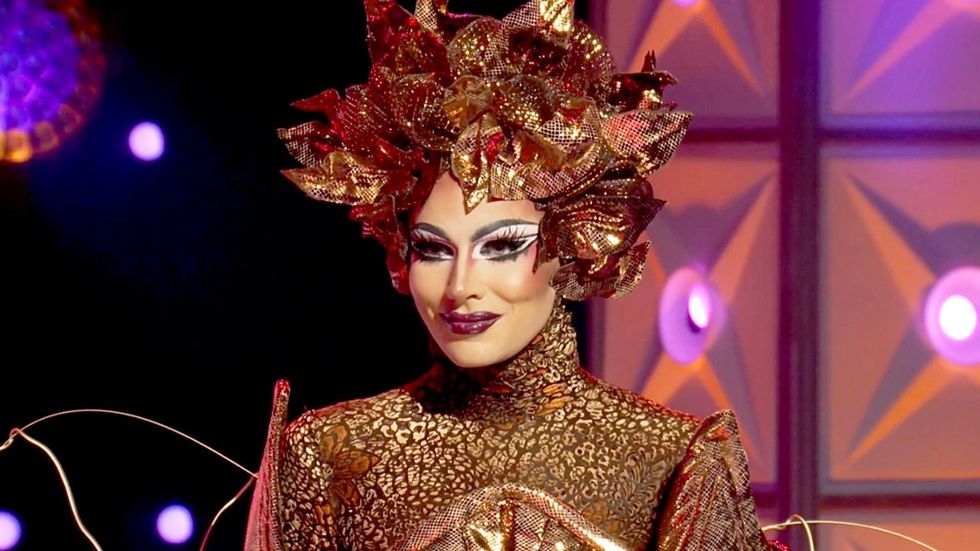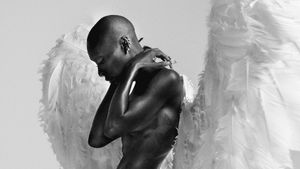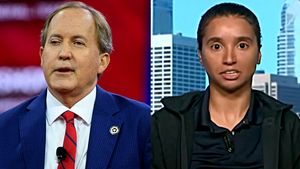Right out the gate, Q made a huge impression with her incredible design ability, her quirky sense of humor, and her clap back skills (even her shady sister Plane Jane took note). So it’s no surprise that the Kansas City, Missouri-based queen would make it to the final four.
While she came just short of clenching a spot in the finale when a book branding and interview challenge placed her in the bottom two alongside Plane Jane, she absolutely made her mark on the competition. The two lip synced “Better Be Good to Me” by Tina Turner and the competition was tight. Sadly, Q was asked to sashay away after one of the most dramatic pauses inDrag Race herstory.
PRIDE caught up with Q to talk about what the experience of Drag Race felt like for her, why the biggest challenge was actually learning to navigate praise and criticism from the fandom, the impact it all had on her mental health, and what she plans to do next.
PRIDE: First of all, congratulations on your time on Drag Race. As you reflect on it, how are you feeling about it?
Q: Overall, I’m really happy with what I put out there, and what I accomplished in the little time that I had to prepare for Drag Race. It’s amazing to me, but looking back on it now I’m just thinking about the impact that it’s had on me, the pressure of what it is to be on television and the impact that has on my mental state, and just being out in the world and being exposed to everybody all the time, 24/7. It’s a lot.
Drag Race is such an incredible platform because you get to show your art to the world. But it also opens you up to lots and lots of both praise and criticism. How do you navigate both of those things?
I don’t know if I have exactly figured out how to navigate it yet, honestly. Some days are better than others. It’s hard because in reality there’s a lot more love and positive energy than there is negative. But it just so happens that the people who are putting the negative energy out into the world are the ones that are actually typing it out, and posting it online. So nine times out of 10 that’s what you see more than the positive.
That’s hard. I can see how much love and effort goes into everything you do. The fandom loves Drag Race, but there’s a part of it — sadly a very vocal part of it — that’s highly critical. Is there anything that you wish people watching understood?
I just wish that they realize that for them it’s entertainment. But for us it’s our livelihood. It’s our careers. We invest tens of thousands of dollars and hundreds and hundreds of hours to do this in such a short amount of time. I just hope that they can see that for future contestants. Give them that grace and praise that they deserve.
I think part of the problem is that we live in these weird unprecedented times where people have so much access to us. How has it been for you navigating something like social media?
Well, it’s definitely been weird because I’ve never considered myself much of a social media person to begin with. I didn’t use X before Drag Race and I got on X because I thought I needed to for Drag Race. Then I just found out that X is not for me. It is not a place that I can deal with. So, I deactivated my account there. I set that boundary. Going into Drag Race I thought I had really tough skin but it’s different being a part of the whole machine of it.
People are going to have their opinions but the one that really matters is your own. Drag Race can be such a mirror, what has the experience taught you about yourself?
I always knew I was competitive, but it definitely was a first-hand account of how competitive I get in that environment. That’s something I kind of already knew, but then I can kind of see how intense it is when you’re on TV. But when it’s like, thousands of dollars on the line every night, it’s a little bit different [between] a challenge win and [not winning]. Those are bills, those are credit card payments, Girl. That’s paying off my designer that I paid to make this costume or it’s paying off on the investment that you’re trying to make worth it. You make this huge investment and you’re not sure what kind of return you’re gonna get. It’s a risk. It may not be high stakes for the viewer but it was high stakes for me. Especially coming from a poor background and building myself up from nothing. That might be why I’m so intense when I compete, and especially when there’s so much money involved.
I relate, I can’t even play board games with my friends because the monster emerges. So no judgment here! Speaking though of your humble beginnings, I feel that you were incredibly generous in the way that you are willing to open up and be vulnerable in the way that you do talking about how you grew up and about your status. Has it been rewarding to share those kinds of stories with people?
There have been multiple experiences that telling my status has made it especially worth it. People have come up to me and told me how much it’s helped them just seeing that on television. Of course, there’s some people who just say nasty, horrible things, you see that sometimes too — but overall, it has been completely worth it. I thought if I could just help one person feel less alone, feel less the way I felt when I was going through my diagnosis it would be worth it to me.
I have no doubt that that’s true. Drag Race lets us fall in love with you, so when you share your struggles, empathy is the natural response. That’s huge and destigmatizing, so again thank you for being so generous and sharing that side of yourself. Ok, I’m gonna shift gears and ask the question we all want to know. Would you do Drag Race again if given the opportunity to return?
How much are they gonna pay me to do it? I would have to be in a very secure mental state and just really ready to invest that money financially to do it again. I still need time to even reflect on this whole experience, what it’s been for me, and how it’s affected me. Before I even move on to the next thing, I know I just need a period of time away from the spotlight to just sit with it.
That makes absolute sense. It’s a huge financial and emotional investment. So let’s end on a fun note. Do you have a favorite memory from the season?
Honestly, just eating lunch with Morphine [Love Dion] and Xunami and the girls. I have to say the relationship I've made with Xunami and Morphine — we talk every day — that's one of the things I treasure most from this whole experience is my friendship with them.































































































































